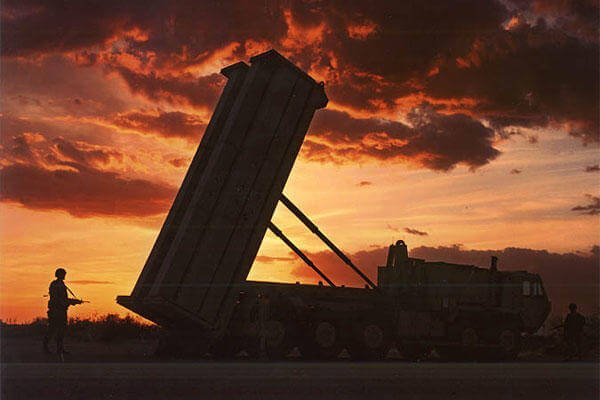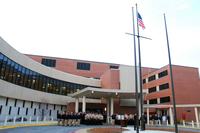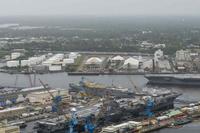North Korea's claim Sunday of launching a satellite atop what could be developed as a long-range missile capable of hitting the U.S. will likely set off debate on more spending for missile defense in the $583 billion fiscal 2017 Pentagon budget proposal to be released Tuesday.
In a statement, Rep. Mac Thornberry, a Republican from Texas and chairman of the House Armed Services Committee, said the North Korean action showed that "seven years of underfunding for U.S. missile defense have given our adversaries uncontested opportunity to advance their capabilities. The President must show leadership in squarely facing the growing threats and in adequately funding our military to meet those threats."
Last year, the U.S. Missile Defense Agency proposed $8.13 billion in fiscal 2016 to improve and expand U.S. anti-missile programs. The proposal was a 3-percent increase over the previous year.
In the flurry of diplomatic activity and condemnations following North Korea's launch, a top U.S. commander in South Korea made the most forceful case to date by the U.S. military for the positioning of the Lockheed Martin Corp.-made Terminal High-Altitude Area Defense, or Thaad, system in South Korea. China has warned against the move in the past and South Korea has previously been non-committal on the system.
At a joint news conference in Seoul with South Korean officials in response to the launch, Army Lt. Gen. Thomas S. Vandal, commander of the U.S. Eighth Army said, "It is time to move forward on this issue. We look forward to close consultation and coordination on that as well as dealing with the threat to peace and stability posed by DPRK," referring to the Democratic People's Republic of Korea."
Ryu Je-seung, a South Korean Defense Ministry official, said the U.S. and South Korea would soon begin discussions on a battery placement. "If THAAD is deployed to the Korean peninsula, it will be only operated against North Korea," Ryu said, apparently seeking to ease the concerns of China.
In a statement, Sen. John McCain, a Republican from Arizona and chairman of the Senate Armed Services Committee, said he was encouraged "that our two countries will begin the process of consultation for deploying the THAAD system to the Korean peninsula. The deployment of this system by the alliance is a critical step to providing a further layer of defenses against North Korean provocations."
South Korea's Yonhap news agency reported that Chinese Vice Foreign Minister Liu Zhenmin immediately summoned the South Korean ambassador to China, Kim Jang-soo, to protest U.S.-South Korea talks on THAAD.
North Korea's state news agency said the launch of the satellite "Kwangmyongsong-4" from the northwest Dongchang-ri site near the Chinese border was a "complete success" and it was making a polar orbit of Earth every 94 minutes.
The agency showed a photo of a white rocket lifting off and military officials at what appeared to be a command center cheering "Supreme Leader" King Jong Un, who is believed to be 33 years old.
In its last launch of a long-range rocket in 2012, North Korea also claimed to have put a satellite in orbit, but no signal has ever been detected.
From Offutt Air Force Base in Nebraska, U.S. Strategic Command said in a statement that its systems "detected and tracked what we assess was a North Korean missile launch into space" which went on a southerly track over the Yellow Sea. STRATCOM said that NORAD (North American Aerospace Defense Command) "determined that at no time was the missile a threat to North America."
North Korea has insisted that its claimed satellite launches were for peaceful purposes but the U.S. has maintained that the real purpose was to test inter-continental ballistic missiles capable of carrying nuclear warheads and hitting the U.S.
At a Pentagon news conference in 2014, Army Gen. Curtis M. Scaparrotti, commander of U.S. Forces-Korea, said the North Koreans were progressing on miniaturizing a nuclear weapon that could be fitted on a long-range missile.
"They've had the right connections, and so I believe have the capability to have miniaturized a device at this point, and they have the technology to potentially actually deliver what they say they have," Scaparrotti said.
South Korean President Park Geun-hye condemned North Korea for "ignoring the warnings of the international community in the wee hours of the morning and carrying out an unacceptable act of provocation by launching the long-range missile in a follow-up to its 4th nuclear test."
She referred to the Jan. 6 underground test of what North Korea claimed to have been a hydrogen bomb. Western experts have said that the test was nuclear, but appeared to lack the force of a hydrogen bomb.
North Korea's bombastic Korean Central News Agency (KCNA) said the underground test was a tribute to the dynastic leadership of "Supreme Leader" Kim Jong Un, his father, Kim Jong Il, and grandfather, Kim Il Sung.
The underground test "demonstrated the invincibility and mightiness of Kim Il Sung's and Kim Jong Il's Korea far and wide and struck terrible horror into the hearts of the U.S. imperialists and their followers," KCNA said.
The rocket launch triggered the usual warnings about tightened economic sanctions and emergency meetings of the United Nations Security Council that follow North Korean provocations.
"This is the second time in just over a month that the DPRK has chosen to conduct a major provocation, threatening not only the security of the Korean peninsula, but that of the region and the United States as well," U.S. Secretary of State John Kerry said in a statement.
"We reaffirm our ironclad commitment to the defense of our allies, including the Republic of Korea and Japan. We will continue to work with our partners and members of the UN Security Council on significant measures to hold the DPRK to account," Kerry said.
Samantha Power, the U.S. ambassador to the UN, told reporters: "We will ensure that the Security Council imposes serious consequences. DPRK's latest transgressions require our response to be even firmer."
In a statement, a spokesman for UN Secretary General Ban Ki-moon called the launch "deeply deplorable" and said that "The Secretary-General reiterates his call on the DPRK to halt its provocative actions and return to compliance with its international obligations."
--Richard Sisk can be reached at Richard.Sisk@Military.com.


























